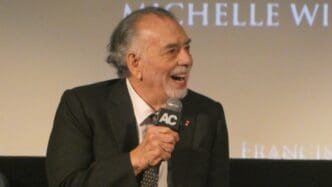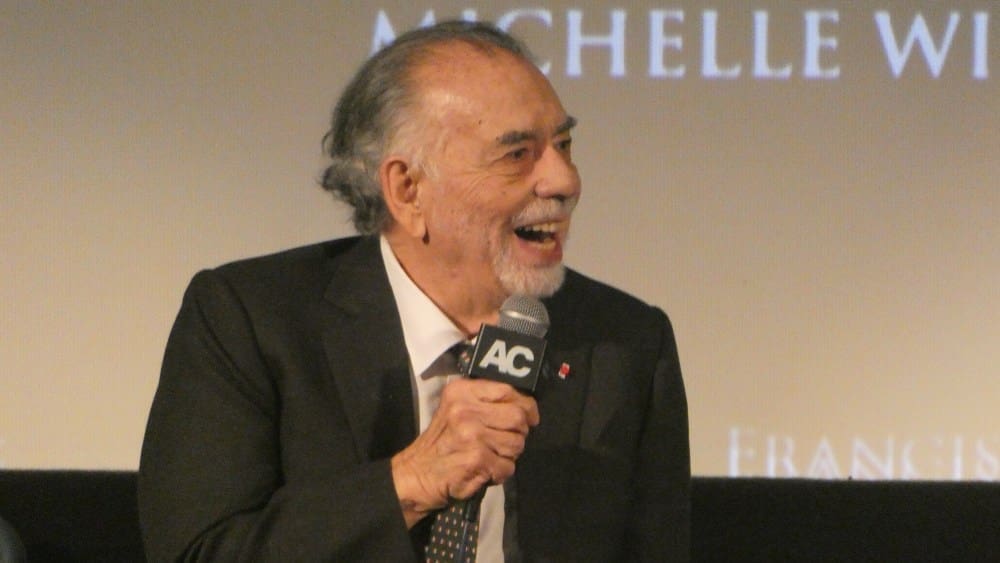As the clock struck midnight, ringing in the New Year at the American Cinematheque, film enthusiasts gathered for not just a screening but an epic conversation. Directed by the legendary Francis Ford Coppola, ‘Megalopolis’ wasn’t the main event. Instead, it served as a catalyst for a passionate discussion on the grand themes of politics, economics, and society.
The evening was more than just a film experience; it was a deep dive into the mind of a cinematic genius. Coppola, armed with his visionary ideals, engaged in a dialogue that transcended mere entertainment. Here was a conversation about reshaping societal structures, challenging norms, and envisioning a future where work could become play and community triumphs over hierarchy.
The Salon Begins: Beyond Filmmaking
Francis Ford Coppola greeted the eager audience with a warm ‘Happy New Year,’ setting the tone for a night of intellectual exploration. Known for his cinematic masterpieces, he focused not on ‘Megalopolis’ itself but on the larger questions it raises. His discussion veered into realms of political, economic, and social ideas that challenge the status quo.
Utopian Ideals and Societal Change
Coppola’s thoughts on eradicating the patriarchy and embracing a community-governed world resonated deeply. Imagining how things could be, rather than how they are, inspired a sense of urgency among attendees. The idea that government might be rebuilt to prioritize neighborhoods over nations was revolutionary.
Echoes of Personal History
Joined by economists like Juliet Shor and innovators like Jim Augustine, Coppola expanded on these ideas. Their presence added depth, bringing academic and practical insights into the mix. This blend of personal and professional perspectives offered a rich tapestry of thoughts on transforming society.
Interactive Cinema: A New Experience
Audience members became participants in an organic discourse. Coppola’s encouragement of open reactions, whether laughter, criticism, or contemplation, fostered a dynamic viewing experience. It was a showcase of cinema as a living conversation.
Economic Visions and Labor Insights
Juliet Shor echoed these sentiments, linking them to her work on the relationship between time and labor. Her observations highlighted the potential shifts in work culture, igniting hope for a balanced future. This marriage of theory and action underscored the night’s discussions.
Government and Community: Rethinking Power
Community action took center stage as Coppola recounted his charity work. These experiences served as real-world examples of his theories in practice, proving that change is possible from the ground up.
A Bibliography of Inspiration
Books and authors Coppola cited formed a guiding framework for his ideology. The mention of Jane Jacobs and even Lady Bird Johnson’s initiatives underscored a journey through thought and action, shaping how societal art and science could intersect.
Reinventing Art and Industry
Coppola’s 14-year break from directing was a testament to his commitment to learning. He shared insights from this period, emphasizing the importance of rehearsal and creativity over mechanical production. His resolve to remain a ‘student’ highlighted a relentless pursuit of artistic growth.
A Vision for a Brighter Tomorrow
Coppola urged the audience to pursue art that is personal and authentic. This encouragement to harness individual brilliance for collective progress concluded the discourse on an optimistic note, inspiring attendees to envision and work towards a better world.
Coppola’s Ultimate Challenge
As the evening drew to a close, Coppola’s final challenge to the audience was clear: embrace radical thinking. His talk echoed with the sentiment that today’s dreams can be tomorrow’s realities if we dare to think differently. It was a fitting end to a night of visionary dialogue.
The event left attendees inspired by Coppola’s blend of film and philosophy. His call for change, both in art and society, lingered as a beacon of possibilities. It was more than a screening; it was a hopeful glimpse into a future sculpted by imagination and action.
Source: Variety







